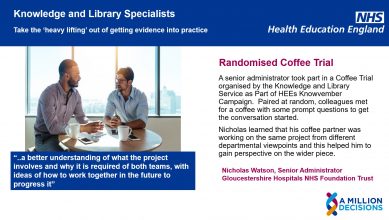Key aspects of the role
• Facilitate the capture, use and dissemination of knowledge
• Maintain knowledge management policies and protocols, systems and processes.
• Produce horizon scanning reports and digests that summarise and synthesise the best available evidence in response to business needs.
• Search for literature and summarise findings to ensure decisions are based upon research evidence
• Maintain and disseminate knowledge assets, including logs of lessons learned.
• Facilitate sessions using knowledge mobilisation tools and techniques to encourage learning and innovation
• Train staff to use knowledge mobilisation tools and techniques to ensure staff are using knowledge effectively and efficiently.

Skills and knowledge
You may require a high level of knowledge and skills in the following CILIP Professional Knowledge and Skills Base (PKSB) sections to work within this role:
Ethics and Values. Underpinning healthcare ethics and values by providing the best available evidence at the right time, in the right place, to inform decision-making and enable better outcomes for patients and populations.
Professional development. Reflecting on practice and being self-aware about performance.
Organistional and environmental context. Understanding organisational priorities and challenges identified by the executive team.
Wider library, data, information and knowledge sector context. Networking across the healthcare economy, both information providers, data analysts and health informaticists, to support shared learning and joint working.
Data Management. Supporting data literacy through research support, enquiry services, critical appraisal clubs and organised web search training.
Information exploitation and use. Delivery of information through routes such as alerts, current awareness, enquiries and literature searches, including saving the time of users by providing time-saving services such as synthesis and summaries of evidence.
Information management. Exploiting a range of platforms including Intranet, Internet, SharePoint, repositories and discovery systems, for storage, collaboration, access, and dissemination of information.
Knowledge management. Helping teams to share and lessons learned, and to articulate tacit knowledge including personal insights.
Literacies and learning. Initiating and contributing to work intended to improve the information, data, digital and health literacy of staff and learners.
Research. Disseminating research evidence to inform service and quality improvement and innovation.
Customer focus. Service design and marketing. Developing knowledge of trends on healthcare provision and national legislation which influences the healthcare landscape and structures (for example, integrated care systems).
Leadership, advocacy, influencing and personal effectiveness. Showing strong leadership skills in order to ensure the visibility and breadth of involvement of the service across the organisation.
Technology and communication. Networking and advocacy within and outside the local organisation to share good practice, maintain professional awareness, and promote services.
Further information about the CILIP Professional Knowledge and Skills Base
Communities of Practice
Knowledge Mobilisation Mailing List
Knowledge2Practice – Twitter @KIPLNetwork
CILIP Knowledge and Information Management Special Interest Group
60 seconds with…Katie Nicholas, Knowledge Specialist
Katie is a Knowledge Officer based at Health Education England; supporting staff to enable them to access knowledge derived from research through searching literature and synthesising the results, helping colleagues connect and share ideas and support them in staying up-to-date with new information in their field
What’s the story of their career to date? Katie worked as a volunteer in a number of local libraries and museums whilst at university studying English literature, enjoying helping people with a wide range of queries and questions and was able to spend some time in the local archives organising and cataloguing material that would be otherwise inaccessible to members of the public. Katie began searching for jobs as her graduation neared looking on the NHS jobs website https://www.jobs.nhs.uk/. Katie was successful in her application for the post of Knowledge Services Assistant in a Mental Health and Public Health Trust; this role involved helping staff with a wide range of queries. Katie took up the opportunity to begin a Masters course, part-time, in Library and Information Management supported by the NHS. This will be completed this year and has also been successful in gaining her current role as a Knowledge Officer and has been doing this for just over a year
What do they do? Every day is different for Katie dependant on requests received from colleagues and information needed. Katie collates bulletins containing news items and reports a well as education opportunities making this information available to NHS staff. Katie also gathers best workforce practice, adding this to a website for staff to access. Katie has a part in conducting strategic searches of health literature in order to answer questions from colleagues and ensure they approach projects in an evidence-based way.
What’s the best thing about their role? Katie feels that the best part of her job is getting to learn about lots of new things and having lots of opportunity to experiment and innovate and feels that there are always news skills to learn as technology and systems develop
Where are they going from here? Katie has only been in her current post for 12 months and is really enjoying the role, looking forward to learning more about the organisation and continuing to develop, finishing her Masters this year will be another milestone and achievement for her
This profile has been created by the Greater Manchester NHS Careers & Engagement Hub in partnership with Central Manchester Foundation Trust.